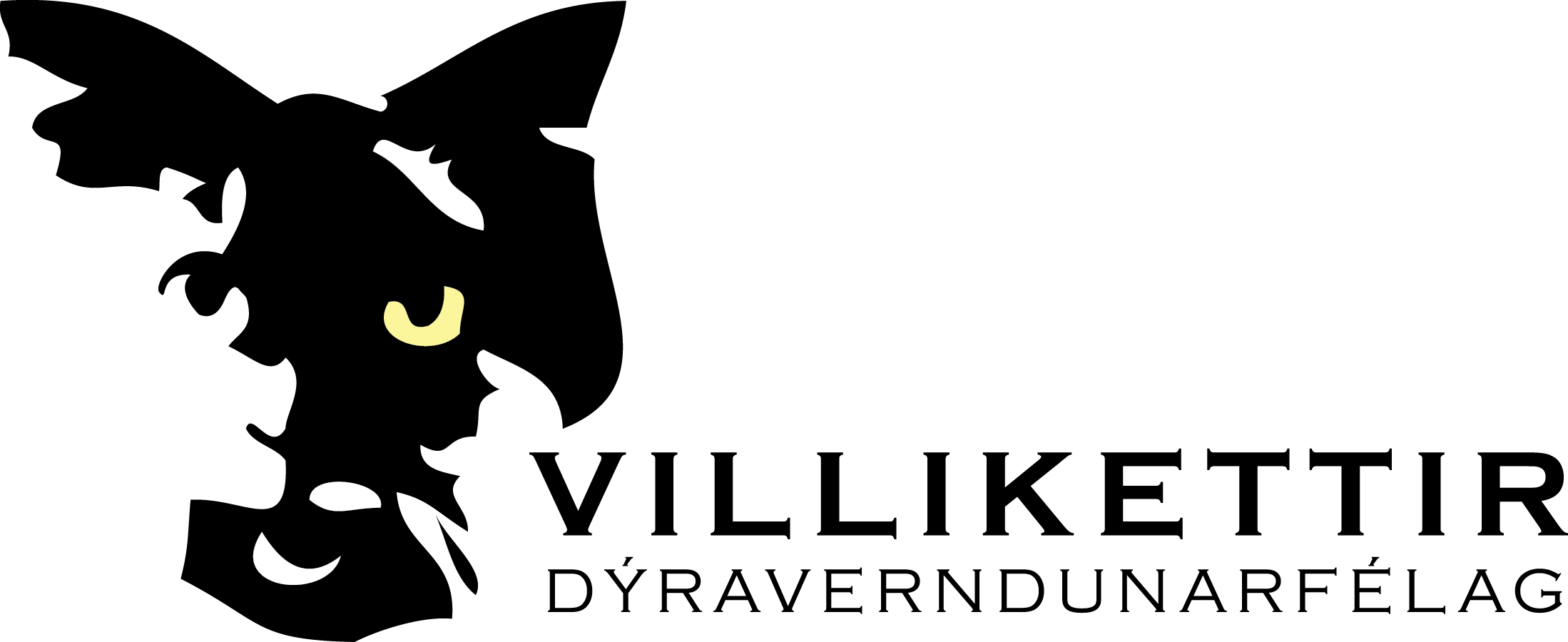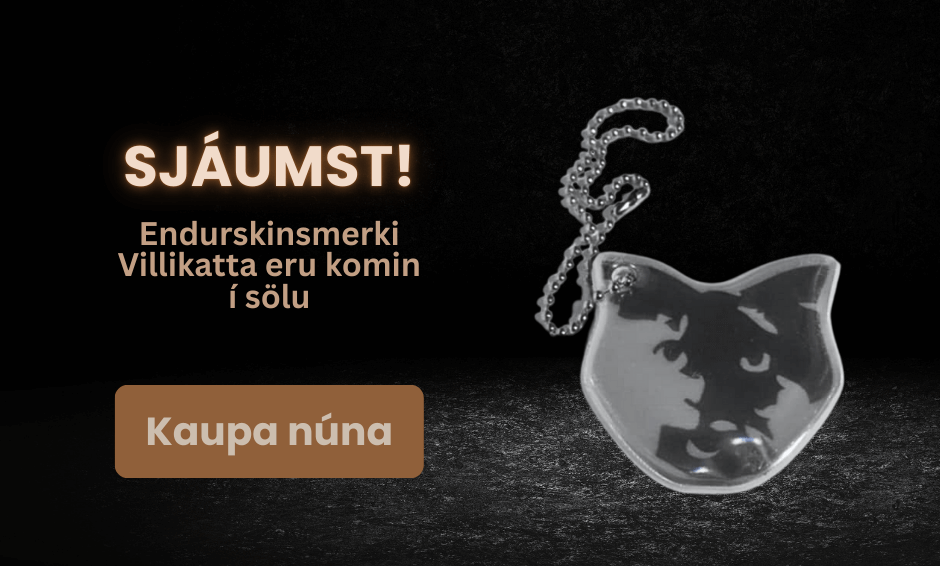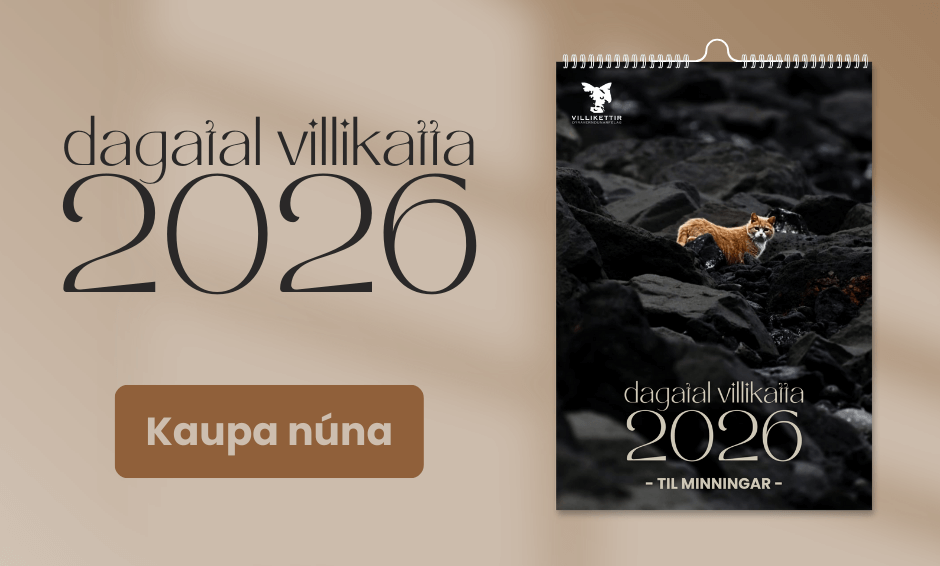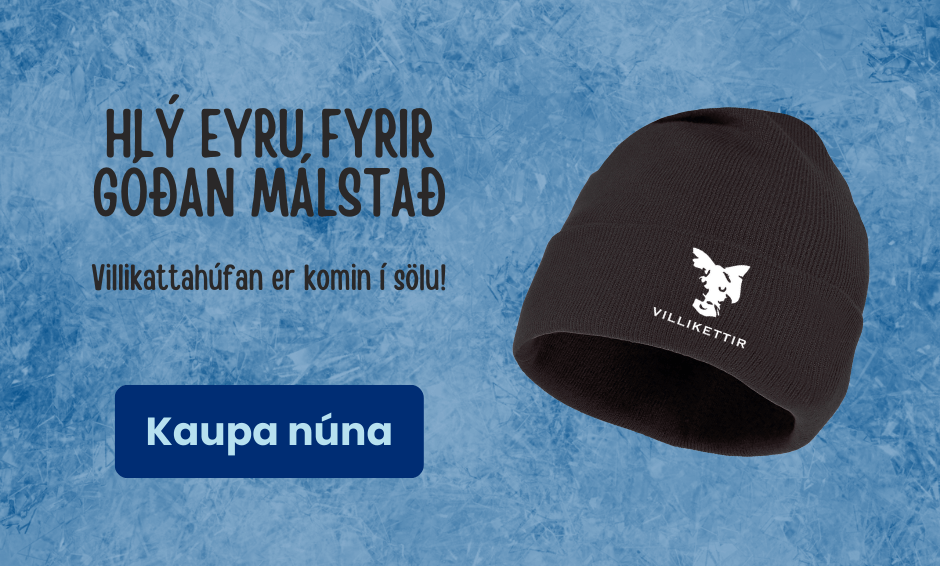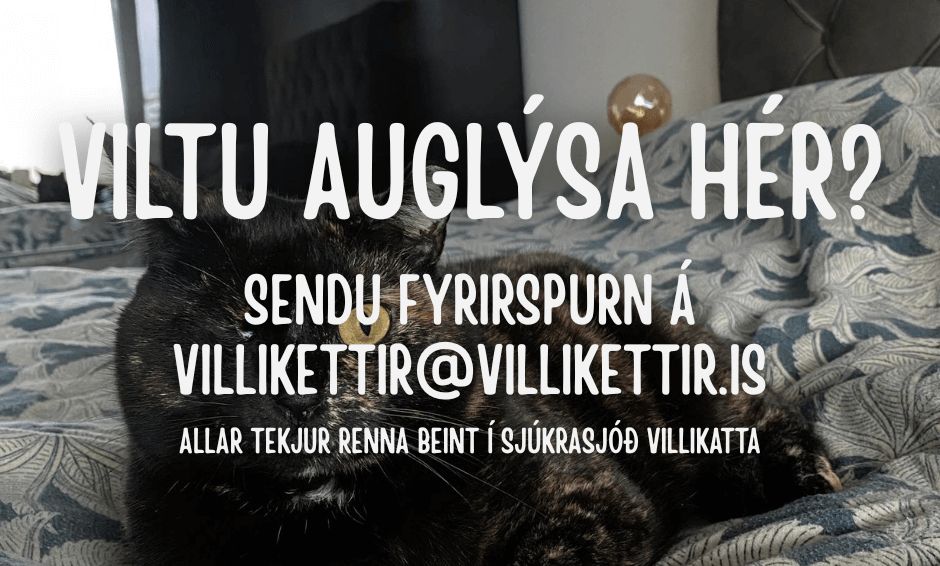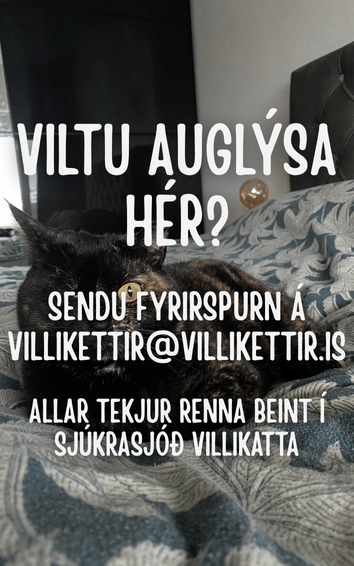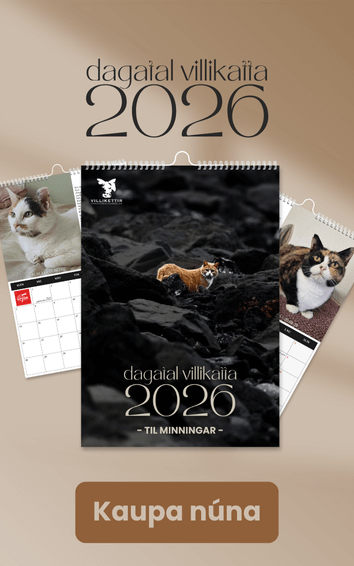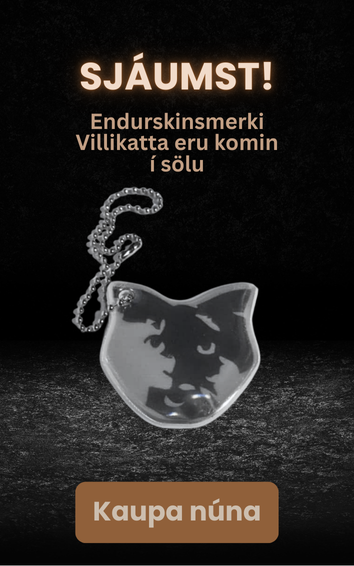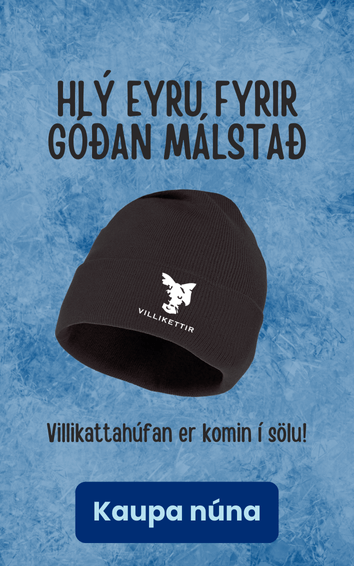Villikettir is
here to stay
The attitude of the authorities towards feral cats has generally been negative, leading to inhumane extermination campaigns. Most feral cats are social creatures and gather in areas where there is some food to be found. Our goal is to help these cats through organized efforts. The most important thing is to capture these cats and spay/neuter them.
International research has shown that TNR (Trap – Neuter – Return) is the most effective method for reducing feral cat populations and improving their welfare. Humane considerations are paramount here.
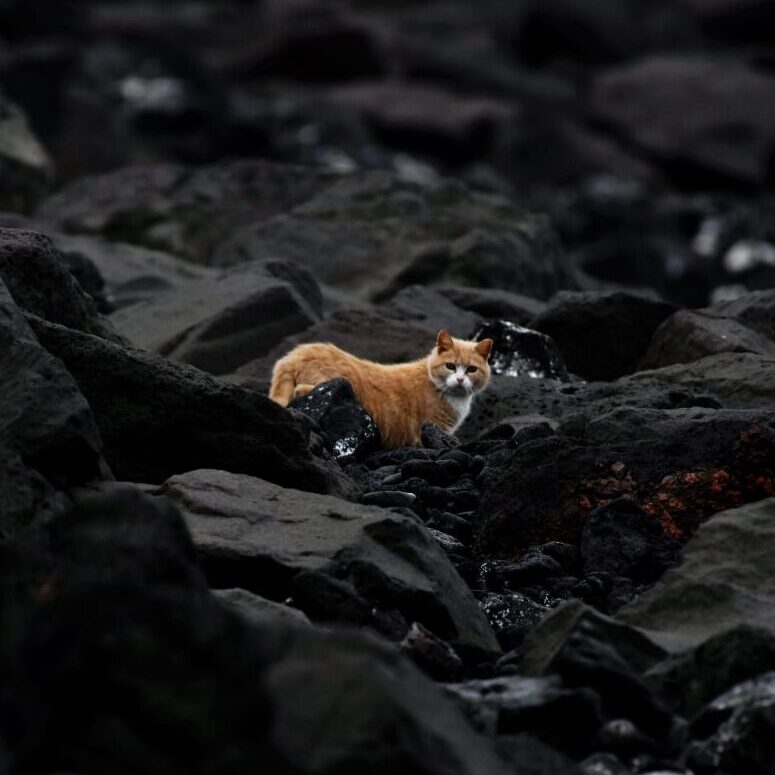
Villikettir Bylaws
Article 1
The association is called Villikettir and its area of activity is Iceland.
Article 2
The association's legal domicile and venue shall be the same as the address of the association's current treasurer.
Article 3
The purpose of the association is to improve the life and welfare of stray and feral cats, to stem their proliferation and to work towards improving the legal environment for feral cats.
Article 4
The association aims to achieve its purpose through the following actions:
– The habitat of feral cats will be mapped and the facilities for cats in the area will be improved.
– The cats will be captured, their health checked by a veterinarian and checked to see if they are microchipped.
– Male cats will be neutered and females will be spayed.
– During spaying/neutering, feral cats must be marked with the universal feral cat sign where a small piece (5 mm) is removed from the tip of the left ear (called “ear-tipping”), so that the cats can be easily identified and/or microchipped.
– If the animal is in great distress and a veterinarian recommends euthanasia, it must be humanely euthanized by a veterinarian.
– Increased discussion and education about the situation of stray and feral cats will be promoted.
Article 5
Membership is open to all individuals who wish to work towards the improved and humane treatment of stray and feral cats in accordance with the aims and objectives of the association and who have reached the age of 18.
Non-profit organizations can become sponsors of the association.
Registered members who have paid the annual membership fee are considered full members. Members are not permitted to speak publicly in the name of the association without the consent of the Central Board.
Article 6
The association's operating period is the calendar year. At the general meeting, the Central Board shall review the past year's results. Only full members may participate in the general meeting.
Article 7
The general meeting shall be held before the end of April each year and shall be called at least two weeks in advance by verifiable means. A general meeting is only legal if it is properly called.
Proposals for changes to the bylaws must be submitted to the Central Board one week before the general meeting and the proposals will then be presented at the general meeting. Candidates for the Central Board must also be submitted to the current Board one week before the general meeting is called.
In order to be eligible to run for the Central Board or Alternate Board, as well as to propose amendments to bylaws, members must have been registered with the association and paid their membership fees for the last two years prior to the annual general meeting.
Bylaws require approval by a 2/3 majority vote at the annual general meeting. All other resolutions at the annual general meeting must receive a simple majority of the votes cast.
The agenda for the annual general meeting shall be as follows:
1. Election of a meeting chairman and secretary.
2. Report of the Central Board on the activities of the association during the past year.
3. The financial accounts of the association for the past year are submitted for approval.
4. Amendments to the bylaws, if there are proposals.
5. Election of the Central Board and Alternate Board.
6. Election of inspectors if there is no Board of Representatives.
7. Determination of membership fees.
8. Other matters.
Article 8
The Central Board of the association shall consist of five members – a chairman and four co-directors, along with two to five alternates elected at the general meeting. If two members have an equal number of votes, a vote shall be taken between them. The Board shall elect among itself a deputy chairman, a treasurer and a secretary at the first meeting after the general meeting. The Board and the alternates shall then divide the duties among themselves.
The chairman shall be elected at the general meeting for a term of one year, and the co-directors shall be elected two at a time for two years, and two shall retire from the Board alternately each year. Only three members may retire from the Board at a time. The two who have served the longest are elected, and then the other two after a year has passed. If a Board member leaves the Board, the first alternate shall take over their position. Alternates shall be elected for a term of one year, and they shall meet soon after the general meeting and decide among themselves who will be the first, second, third, fourth and fifth alternates. The decision of the Alternate Board on the order of alternates shall be notified to the Central Board as soon as possible.
Thus, the first alternate will replace at a Board meeting any Board member who announces their absence (i.e. cannot participate in a Board meeting in person or via teleconferencing) and then acquire the rights of a full Board member. The second alternate will replace a second Board member if more than one Board member announces their absence, and so on. The same applies if a Board member resigns from the Board in the middle of a term, then the first alternate will take their place until the next general meeting.
Article 8.A Duties of the Central Board
The Central Board shall ensure that the association’s organization and operations are always in good order and in accordance with the association’s bylaws.
The Central Board is responsible for the association’s finances and assets and makes all major decisions related to finances. It shall also ensure that finances are always in good order, such as accounting and handling of funds.
The Central Board shall monitor the work of regional departments that are or may be operating.
The Central Board shall otherwise take a keen interest in anything that may be of benefit to the association.
Article 8.B Regional departments and their respective boards
Within the association, regional departments operate throughout the country. The role of each regional department is to improve the life and welfare of stray and feral cats and to prevent their increase in population in that respective region. (cf. Article 4) Each regional department shall have its own board consisting of two to five volunteers. The role of the Regional Department Board is to maintain an overview of its region, to handle communications with both the Central Board and those who contact the regional department, and also to handle purchasing and accounting for its regional department.
Article 8.C Board of Representatives
The association shall have a Board of Representatives, which shall advise the Central Board on various major issues that arise within the association. The Board of Representatives shall consist of one member from each regional department of the association. The board of each regional department shall nominate its representative in writing to the Central Board of Villikettir and this shall remain in effect until revoked in writing. Those who are elected shall nominate a chairman and a secretary from among the Board of Representatives. The chairman of the Board of Representatives shall call a meeting at least once a year before the general meeting, or as deemed necessary, and no resolution shall be passed by the meeting of the Board of Representatives on matters not mentioned in the notice of meeting. Otherwise, a meeting of the Board of Representatives shall be held if one of its members requests such a meeting in writing. The Board of Representatives shall be called to meetings in writing with at least one week's notice. The agenda shall be included in the notice of meeting. The weight of votes shall determine the results at Board of Representatives’ meetings.
Minutes shall be recorded in a minutes book and shall be accessible to Villikettir’s Central Board.
The Board of Representatives shall be the supervisor of the association’s activities and shall monitor that the association’s bylaws and articles of association are implemented and shall thus be responsible to the association’s Central Board. The Board of Representatives shall have access to the minutes of the Central Board in order to form an opinion on the matters discussed and approved there. The Board of Representatives is the social inspector of the association’s accounts. Those who sit on the Board of Representatives may not sit on the Central Board or the Alternate Board.
Article 8.D Board of Trustees
The Board of Trustees consists of the same members as the Board of Representatives. They are the contacts for volunteers throughout the country. Volunteers must contact a representative on the Board of Trustees/Board of Representatives with any complaints regarding their work as a volunteer at Villikettir. The representative must present the matter to the Board of Representatives at the next meeting, where the matter will be discussed in detail and it will either be resolved at the meeting or directed to the proper channels within the association.
Article 9
A decision on membership fees shall be made at the general meeting. Membership fees shall be collected annually in accordance with the decision of the last general meeting.
Article 10
Donations, membership fees and contractual amounts arising from agreements with municipalities shall be used to cover the cost of health checks, spaying & neutering, vaccinations and deworming of the cats, together with other necessary expenses for the welfare of the cats, such as the purchase of food, and also to improve the conditions of the cats in their habitats as appropriate at any given time. An attempt shall always be made to collect funds separately for larger operations, and the Central Board of the association shall establish a special medical fund that can be used for such operations.
Article 11
The decision to dissolve the association can only be submitted by the Central Board. The proposal shall be considered at the general meeting and must be approved by 2/3 of the votes and its assets will be transferred to a fund that supports the spaying/neutering of domestic cats and/or stray/feral cats.
Approved at the Villikettir general meeting on April 14, 2024
Villikettir Central Board
Villikettir Central Board for the year 2024-2025:
Jacobina Joensen, Chairman
Bjarney Ingimarsdóttir, Treasurer
Ragna Þorsteinsdóttir, Secretary
Anna Jóna Ingu Ólafardóttir, Deputy Chairman
Eva Hauksdóttir, Co-Director
Alternate Board:
Ásdís Erla Valdórsdóttir
Melinda Kumbalek
Sara Bergmann Friðriksdóttir
Jóna Guðmundsdóttir
Elísa Hallgrímsdóttir
Board of Representatives:
Guðný Tómasdóttir
Jóna Símónía Bjarnadóttir
Elín Hermannsdóttir
Steinunn Ragnhildur Guðmundsdóttir
Jennifer Harnisch
Dagný Jónsdóttir
Sonja Rut
Who are we?
The Villikettir association was founded in early 2014 to protect the welfare of feral cats in Iceland. New animal protection laws came into effect at the beginning of the same year and were a major improvement for animal protection in Iceland. Unfortunately, the rights of feral cats were not sufficiently clarified, but we believe that the general provisions of the new law are in their favor.
The Villikettir association therefore intends, in accordance with the new animal protection laws, to seek improvements for feral cats in this country according to recognized methods that have been successful in numerous other countries.
What methods do we use?
We use the Trap-Neuter-Return (TNR) method, which is the globally recognized method for humanely managing feral cat populations without killing them. Multiple traps are placed in areas where the cats are most active. Then they are captured, spayed/neutered and released back into the same area, except for kittens or seriously injured cats. This method has been particularly successful in other countries. We then ensure that the released cats have shelter available in the area and that volunteers are present to feed them.
Why?
Moral arguments
It is often said that a society can be judged by how it treats those who are less fortunate. For a long time, Icelandic society has ignored the problems of feral cats or viewed them as a plague. However, according to the respected philosopher, Peter Singer, it is morally questionable how often we put the needs of animals beneath our own. As a society, we are responsible for the existence of feral cats in Icelandic nature and it is therefore our responsibility to ensure that their right to exist is respected.
Legal arguments
In Article 1 of the new Icelandic Animal Welfare Act, it is stated that its aim is to promote the welfare of animals, that they are free from distress, hunger, thirst, fear, suffering, pain, injury and disease. Furthermore, that they can display their normal behavior as much as possible, which supports the right for feral cats to exist in the areas where they happen to live. In Article 8, the same law deals with the duty to help, which means that anyone who comes across a sick, injured or helpless animal must provide it with care as soon as possible. This is the role that Villikettir has taken on.
Historical arguments
TNR has been used in many of our neighboring countries. The method has been used in Denmark, Germany, the UK and the USA, for example. One case study comes from the feral cat community at Stanford University in the USA, where an animal protection group was formed to convince the government to use TNR rather than culling.
Over time, the population has been reduced from over 1500 cats to a manageable 200 cats.
Scientific arguments
Many studies support the effectiveness of TNR. Studies show that cat populations can be reduced by up to 36% in two years if the method is used, and by up to 66% over 11 years. They then gradually decrease due to natural causes of death in cats.
Ecological arguments
The urban environment benefits from the presence of feral cats. They hunt mice and deter the invasion of rats and gulls (“Want a rat or a cat?”). It has also been shown that releasing feral cats rather than killing them is a long-term solution because they maintain their territories and thus prevent other feral cats from establishing themselves in these areas where food and shelter are available and reproducing there.
